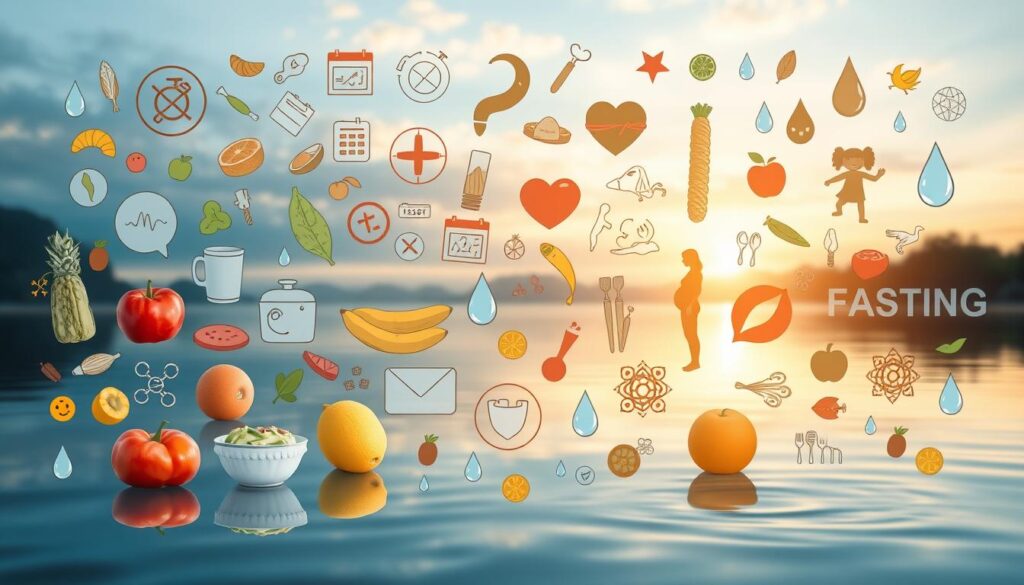Water fasting is popular for weight loss and health benefits. But, how long to water fast is a big question. Experts say it can help with autophagy and reduce inflammation. Yet, long water fasts can also have risks.
It’s important to talk to a doctor before starting a water fast. They can help you figure out the right length for your health and goals. Check out this article for more info.
Short water fasts of 24-72 hours are usually safe. But, longer fasts like five, seven, or forty days need careful consideration. Fasting experts say long fasts (72+ hours) are good for health, but not for everyone.
When choosing a water fasting duration, think about your health, age, and lifestyle. Some people find intermittent fasting, like the 16/8 method, easier and safer. It still offers benefits without the risks of long water fasts.
Deciding to water fast and for how long should be a doctor’s call. They can give you personalized advice on fasting based on your situation. By weighing the pros and cons, you can find the best fasting plan for you.
Key Takeaways
- Short-term water fasts of 24-72 hours are generally safe for most people.
- Prolonged water fasting should be approached with caution and under medical supervision.
- Fasting experts recommend prolonged fasting (72+ hours) 1-2 times a year for overall health.
- Intermittent fasting schedules may be more sustainable for many individuals.
- Consult with a healthcare professional to determine the optimal water fasting duration for your individual needs and goals.
What is Water Fasting?
Water fasting means only drinking water for a certain time. You don’t eat or drink anything else. This makes your body use fat for energy, which can help you lose weight and feel better.
Definition of Water Fasting
Water fasting is simple: you only drink water and don’t eat for a while. How long you fast can vary, from a day to weeks. Always fast under a doctor’s watch to stay safe.
| Duration | Recommended Water Intake |
|---|---|
| 24-72 hours (average) | Men: ~15.5 cups Women: ~11.5 cups |
| 7 days | Safely possible for healthy individuals |
| 30-40 days | Requires strict medical supervision |
History of Fasting Practices
Fasting has been around for centuries, tied to many religions. It’s seen as a way to purify the soul, practice self-control, and connect with the divine. For example:
- Muslims fast during Ramadan, not eating or drinking from dawn to sunset.
- Christians fast during Lent, a 40-day period before Easter.
- Jews fast on Yom Kippur, seeking forgiveness and spiritual renewal.
Many cultures also fast for health and longevity. Ancient Greeks and Hippocrates saw fasting as healing. They believed it improved both body and mind.
“Everyone has a physician inside him or her; we just have to help it in its work. The natural healing force within each one of us is the greatest force in getting well.” – Hippocrates
Today, water fasting is popular for its health benefits. But, we need more research to fully understand its effects. Always fast with a doctor’s guidance to stay safe and get the best results.
Benefits of Water Fasting
Water fasting has become popular for its health benefits. It may help with weight loss, prevent chronic diseases, and boost autophagy. More research is needed to fully understand these benefits.
Weight Loss
Water fasting is known for its weight loss benefits. The body uses stored fat for energy, leading to weight loss. A study showed an average weight loss of 13 pounds in middle-aged men after an eight-day fast.
However, it’s important to remember that lasting weight loss comes from a balanced diet and exercise too.
Reduced Risk of Chronic Diseases
Water fasting may lower the risk of diseases like diabetes and heart disease. Animal studies suggest it reduces inflammation and boosts the immune system. This could help prevent chronic diseases.
A 2022 study found significant blood pressure reductions in people with obesity after a 10-day fast. Another study showed 90% of participants had normal blood pressure after a 10 to 11-day fast.
| Study | Findings |
|---|---|
| 2018 study | Participants experienced reductions in blood pressure, body weight, and oxidative stress after an 11-day water fast |
| 2017 article | Oxidative stress, a contributor to chronic diseases, may be reduced through water fasting |
Promotion of Autophagy
Water fasting also promotes autophagy, a process that breaks down damaged cells. This may help prevent diseases and slow aging. Fasting for three days or more can reduce insulin levels, triggering autophagy.
Animal studies show fasting lowers leptin levels, which helps control fat storage.
While the potential benefits of water fasting are exciting, it’s crucial to approach fasting with caution and under the guidance of a healthcare professional. More human studies are needed to confirm these benefits and determine the optimal fasting duration for achieving them.
Risks and Dangers of Water Fasting
Water fasting might seem appealing, but it comes with risks. Dehydration is a big concern because the body misses out on nutrients and electrolytes. This can make you feel dizzy, tired, and confused.
Electrolyte imbalances are another risk. When fasting, the body uses fat and muscle for energy, releasing electrolytes. Without these, serious issues like heart problems and kidney issues can happen.
Low blood sugar, or hypoglycemia, is also a risk. Without glucose from food, blood sugar drops. This can cause shakiness, irritability, and even seizures in extreme cases.
| Study | Participants | Duration | Side Effects |
|---|---|---|---|
| 2021 Study | 12 | 8 days | Changes in blood and urine markers, body composition, reduced weight, lower stress levels |
| 2022 Study | 48 | 10+ days | Weight and BMI decreases, blood pressure reductions, headaches, acid reflux, fatigue, anxiety (50% dropout rate) |
| Medically Supervised Fasts | – | Up to 2 days | Mostly mild to moderate: fatigue, nausea, headaches |
Fasting for too long can cause muscle loss. The body uses protein for energy when it runs out of glucose. This can harm your health and metabolism in the long run.
“Decreased bone formation and increased mineral dissolution were observed during acute fasting in young women.” – Grinspoon et al., 1995
Water fasting can also lead to serious problems like kidney issues, heart problems, and even death. This is especially true for people with health conditions or those fasting for too long without medical help.
To stay safe, talk to a healthcare professional before starting a water fast. They can help you understand the risks and guide you on how to fast safely.
Who Should Not Water Fast?
Water fasting might seem good for health, but it’s not for everyone. Some people should not fast or need a doctor’s watch because of risks. It’s key to think about your health, age, and medical conditions before fasting.
Pregnant and Breastfeeding Women
Pregnant and nursing moms need more nutrients for their babies. Water fasting can cause nutrient shortages, harming both mom and baby. It’s not safe to fast when pregnant or nursing because the body needs steady nutrients.
People with Certain Medical Conditions
Those with certain health issues should not fast without a doctor’s okay. These include:
- Chronic kidney disease
- Diabetes (type 1 and type 2)
- Eating disorders
- Heartburn or gastroesophageal reflux disease (GERD)
- Heart conditions
- Uncontrolled migraines
Fasting can worsen symptoms or cause problems for these conditions. For example, diabetics might see blood sugar swings.

Underweight Individuals
Those who are underweight or have eating disorders should not fast. Fasting can lead to nutrient and electrolyte imbalances, harming their health.
Children and Adolescents
Children and teens under 18 should not fast. Their bodies need enough food for growth, brain work, and health. Fasting can cause nutrient shortages and growth problems.
| Group | Reason for Avoiding Water Fasting |
|---|---|
| Pregnant and Breastfeeding Women | Increased nutritional demands for fetal and infant development |
| People with Certain Medical Conditions | Potential exacerbation of symptoms or complications |
| Underweight Individuals | Higher risk of nutrient deficiencies and health complications |
| Children and Adolescents | Adequate nutrition required for proper growth and development |
Also, those who smoke, have addictions, or take many medications should talk to a doctor before fasting. Fasting might affect medication or worsen health issues.
Preparing for a Water Fast
Before starting a water fast, it’s key to prepare your body and mind. Taking the right steps can help avoid risks and make the most of your fasting experience. Consider talking to a doctor, cutting down on food, and picking the right fasting length.
Consulting with a Healthcare Professional
Talking to a doctor is a crucial step before a water fast. They can check your health, talk about risks, and give advice based on your health history. This is especially important if you have health issues or take medicines that fasting might affect.
A study found that people with certain health problems, like diabetes or low blood pressure, should talk to a doctor before fasting. Getting professional advice ensures your fast is safe and fits your needs.
Gradually Reducing Food Intake
To ease into fasting, start by eating less food before your fast. This helps your body get used to not eating solid food. Start by cutting out processed foods and sugary snacks.
Eat foods like fruits, veggies, and lean proteins instead. As you get closer to fasting, eat lighter meals like soups and smoothies. This way, your body is ready for the fast. For more tips on easing into fasting, visit https://www.wikihow.com/Perform-a-Water-Fast.
Choosing the Right Time and Duration
Choosing the right time and length for your fast is important. Think about your work, social life, and stress levels. Start with shorter fasts, like 24 to 48 hours, and then increase the time.
Research says a 48-hour fast is common, with people fasting 1–2 times a month. Find a fasting schedule that works for you.
| Fasting Duration | Potential Benefits | Considerations |
|---|---|---|
| 24-48 hours | Increased autophagy, reduced inflammation | Suitable for most healthy individuals |
| 3-5 days | Enhanced weight loss, improved cellular repair | May require medical supervision |
| 7+ days | Potential for significant health benefits | Requires close medical monitoring |
Listen to your body and adjust your fast as needed. If you feel very bad or sick, stop fasting and see a doctor. Choosing the right fasting time and length helps you enjoy the benefits while staying safe.
How Long Should You Water Fast? Expert Recommendations
The length of a water fast can vary based on several factors. Most people fast for 24 to 72 hours. They drink two to three liters of water each day. Some experts believe longer fasts, like 7 to 14 days, can lead to deeper benefits like autophagy and stem cell regeneration.

Dr. Goldhamer’s TrueNorth Health Center in Santa Rosa, California, has helped over 10,000 patients with fasting. They offer fasts from 5 to 40 days. These are for conditions like high blood pressure, diabetes, and autoimmune diseases.
“A landmark study conducted by Dr. Goldhamer regarding the benefits of water-only fasting involved 174 consecutive patients with hypertension. The study demonstrated an average drop of 60 points in stage III hypertension, independent of medication effects.”
Longer fasting can be beneficial but risky. It’s best done under a doctor’s watch. For many, shorter fasts like 16/8 or 5:2 are safer and more doable. They still offer fasting benefits without the dangers of long water fasts.
| Fasting Duration | Potential Benefits | Expert Recommendations |
|---|---|---|
| 24-72 hours | Weight loss, reduced triglyceride levels | Suitable for most people |
| 7-14 days | Autophagy, stem cell regeneration | Only under medical supervision |
| Intermittent fasting (16/8, 5:2) | Sustainable approach to fasting benefits | Safe for most people |
Choosing the right fasting length depends on many factors. These include your health, age, and fasting experience. Always talk to a healthcare professional before starting a fasting plan. They can help find the best fasting length for you.
Guidelines for a Safe Water Fast
Starting a water fast requires careful steps to ensure a healthy experience. Water fasting can help with weight loss and cell renewal. But, it’s important to be cautious and prepare well.
Staying Hydrated
Staying hydrated is key during a water fast. Since you’re not getting fluids from food, drinking lots of water is crucial. Health experts say to drink about 2 liters a day, depending on your age, sex, and activity level.
To avoid dehydration, drink more than 8 cups of water a day. Dehydration can cause fatigue, dry mouth, and headaches. So, listen to your body and drink more if needed. For more information, visit this link.
Avoiding Strenuous Activities
It’s okay to exercise lightly on fast days. Try walking, mild yoga, or stretching. These activities keep you active without too much strain.
Stay away from hard activities during your fast. Your body has less energy. If you feel dizzy or very tired while exercising, stop and rest.
Most fasting regimes suggest people fast for no more than 24 hours at a time to minimize the risk of adverse effects.
Listening to Your Body
Pay close attention to your body’s signals during a water fast. If you feel faint, weak, or dizzy, stop fasting and see a doctor if needed. Some signs you might not be doing well include:
- Extreme hunger or cravings
- Irritability and mood changes
- Inability to focus or concentrate
- Headaches or migraines
- Nausea or stomach discomfort
If these symptoms don’t go away or get worse, it’s time to stop fasting and eat solid foods again.
| Fasting Method | Description |
|---|---|
| 5:2 Fasting | Restrict calorie intake for 2 days per week (500 calories per day for cisgender females and 600 for cisgender males) |
| 16:8 Fasting | Consume food within an 8-hour window and fast for the remaining 16 hours daily |
| Alternate Day Fasting | Fast for 24 hours on alternate days |
By following these guidelines, staying hydrated, avoiding hard activities, and listening to your body, you can make your water fast safer and more successful.
Breaking a Water Fast
After a water fast, it’s key to break it slowly to avoid digestive issues. Emma Roberts, a holistic nutrition coach, suggests adding food gradually. If you fasted for five days, start with solid foods after two and a half days.
Reintroducing Food Gradually
Start with small amounts of easy-to-digest foods like bone broth, avocado, and berries when breaking a water fast safely. Increase your food portions and variety over a few days. This helps your body adjust to solid foods without discomfort.
Choosing Nutrient-Dense Foods
Focus on nutrient-dense foods post-fast as you start eating again. Choose meals high in protein and healthy fats to aid recovery. Include lots of fruits and veggies for vitamins, minerals, and fiber. These foods nourish your body and support your health as you return to regular eating.
Avoiding Processed and High-Fat Foods
Stay away from unhealthy foods after fasting when breaking your fast. Avoid processed foods, sugary snacks, and high-fat meals. They can upset your stomach. Stick to whole, unprocessed foods that are easy to digest and rich in nutrients.




